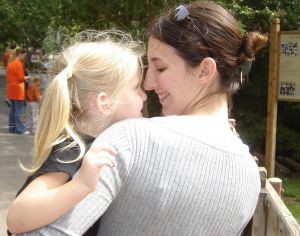 Some parents misconstrue Attachment Parenting (AP) as promoting undisciplined children and martyred parents, when in actuality, Attachment Parenting has a strong basis in discipline and balance.
Some parents misconstrue Attachment Parenting (AP) as promoting undisciplined children and martyred parents, when in actuality, Attachment Parenting has a strong basis in discipline and balance.
Parents are encouraged to look at child behavior in a different perspective than a punishment-based mindset. Children need abundant nurturing and an authentic, open bond with their parents based in trust rather than in fear.
This doesn’t mean that AP parents never say “no.” In fact, boundary-setting is very important to Attachment Parenting. What it means is that AP parents approach discipline in a different way — instead of punishing for undesirable behavior, they teach and guide their children through non-punitive ways. AP parents strive to teach problem-solving.
It’s also important for AP parents to teach emotional health by modeling. Take tantrums, for example, a natural response to boundary setting for a toddler or young child. Tantrums, or “losing it,” is a learned response for adults. A parent who “loses it” in response to their child’s behavior and punishes the child isn’t meeting that child’s need for guidance into how to handle strong emotions like frustration and disappointment, but actually teaching the child that tantrums can’t be controlled except by lashing out at others — or alternatively, stuffing emotions in the case of a parent who is more likely to not set firm boundaries. AP parents are able to identify and respond to their own strong emotions, and therefore are then able to teach their children in how to manage their own tantrums over time through emotion-coaching and problem-solving.
For example, for children — and, to be honest, adults too — a meltdown may be precipitated by tiredness, hunger, illness or a feeling of emotional disconnect from others. These contributors can be addressed, which can significantly and immediately reduce the number of tantrums. The remaining tantrums can then be addressed from a point of view of what emotional needs is the child trying to express: Does the child feel misunderstood? Does the child need more choices? Does the child need help learning a new skill?
I like to say that discipline begins at birth, because parents are always teaching their child something, even newborn babies, by how they respond and what priority they give to a warm, compassionate but balanced parent-child relationship. Positive discipline is rooted in the right relationship between a parent and child.

Very interesting discussion here! I think I’d agree that discipline and a lot of other behaviors will begin at birth with how the parents treat their infant, so it’s important to be conscious of what you do around baby. Thanks for sharing your insight!